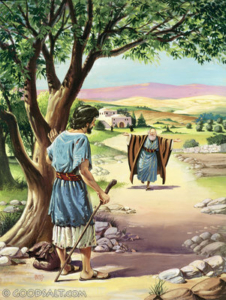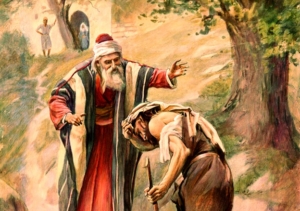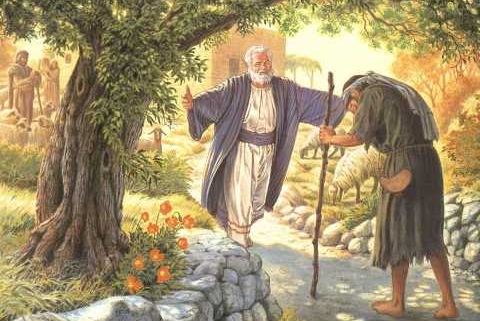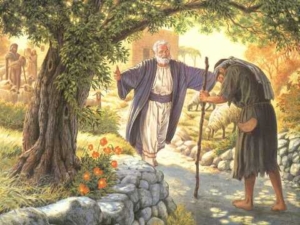Gospel, readings and reflection 27.3.2022
Lectionary: 33
Reading I
The LORD said to Joshua,
“Today I have removed the reproach of Egypt from you.”
While the Israelites were encamped at Gilgal on the plains of Jericho,
they celebrated the Passover
on the evening of the fourteenth of the month.
On the day after the Passover,
they ate of the produce of the land
in the form of unleavened cakes and parched grain.
On that same day after the Passover,
on which they ate of the produce of the land, the manna ceased.
No longer was there manna for the Israelites,
who that year ate of the yield of the land of Canaan.
Responsorial Psalm
R. (9a) Taste and see the goodness of the Lord.
I will bless the LORD at all times;
his praise shall be ever in my mouth.
Let my soul glory in the LORD;
the lowly will hear me and be glad.
R. Taste and see the goodness of the Lord.
Glorify the LORD with me,
let us together extol his name.
I sought the LORD, and he answered me
and delivered me from all my fears.
R. Taste and see the goodness of the Lord.
Look to him that you may be radiant with joy,
and your faces may not blush with shame.
When the poor one called out, the LORD heard,
and from all his distress he saved him.
R. Taste and see the goodness of the Lord.
Reading II
Brothers and sisters:
Whoever is in Christ is a new creation:
the old things have passed away;
behold, new things have come.
And all this is from God,
who has reconciled us to himself through Christ
and given us the ministry of reconciliation,
namely, God was reconciling the world to himself in Christ,
not counting their trespasses against them
and entrusting to us the message of reconciliation.
So we are ambassadors for Christ,
as if God were appealing through us.
We implore you on behalf of Christ,
be reconciled to God.
For our sake he made him to be sin who did not know sin,
so that we might become the righteousness of God in him.
Verse before the Gospel
I will get up and go to my Father and shall say to him:
Father, I have sinned against heaven and against you.
Tax collectors and sinners were all drawing near to listen to Jesus,
but the Pharisees and scribes began to complain, saying,
“This man welcomes sinners and eats with them.”
So to them Jesus addressed this parable:
“A man had two sons, and the younger son said to his father,
‘Father give me the share of your estate that should come to me.’
So the father divided the property between them.
After a few days, the younger son collected all his belongings
and set off to a distant country
where he squandered his inheritance on a life of dissipation.
When he had freely spent everything,
a severe famine struck that country,
and he found himself in dire need.
So he hired himself out to one of the local citizens
who sent him to his farm to tend the swine.
And he longed to eat his fill of the pods on which the swine fed,
but nobody gave him any.
Coming to his senses he thought,
‘How many of my father’s hired workers
have more than enough food to eat,
but here am I, dying from hunger.
I shall get up and go to my father and I shall say to him,
“Father, I have sinned against heaven and against you.
I no longer deserve to be called your son;
treat me as you would treat one of your hired workers.”’
So he got up and went back to his father.
While he was still a long way off,
his father caught sight of him, and was filled with compassion.
He ran to his son, embraced him and kissed him.
His son said to him,
‘Father, I have sinned against heaven and against you;
I no longer deserve to be called your son.’
But his father ordered his servants,
‘Quickly bring the finest robe and put it on him;
put a ring on his finger and sandals on his feet.
Take the fattened calf and slaughter it.
Then let us celebrate with a feast,
because this son of mine was dead, and has come to life again;
he was lost, and has been found.’
Then the celebration began.
Now the older son had been out in the field
and, on his way back, as he neared the house,
he heard the sound of music and dancing.
He called one of the servants and asked what this might mean.
The servant said to him,
‘Your brother has returned
and your father has slaughtered the fattened calf
because he has him back safe and sound.’
He became angry,
and when he refused to enter the house,
his father came out and pleaded with him.
He said to his father in reply,
‘Look, all these years I served you
and not once did I disobey your orders;
yet you never gave me even a young goat to feast on with my friends.
But when your son returns
who swallowed up your property with prostitutes,
for him you slaughter the fattened calf.’
He said to him,
‘My son, you are here with me always;
everything I have is yours.
But now we must celebrate and rejoice,
because your brother was dead and has come to life again;
he was lost and has been found.’”

Reflection:-
Coming to his senses he thought, “How many of my father’s hired workers have more than enough food to eat, but here am I, dying from hunger. I shall get up and go to my father and I shall say to him, ‘Father, I have sinned against heaven and against you. I no longer deserve to be called your son; treat me as you would treat one of your hired workers.’” Luke 15:17–19
Why do we cling to our sins? This passage comes from the story of the Prodigal Son. We should know that story well. The son decided to leave his father and take his future inheritance, spending it on a life of sin. When the money he had ran out, he was in desperate need. So what did he do? He came to his senses!
This line alone is worth our meditation. First, it reveals what happens to a person who falls into a life of sin. In this case, the son eventually reaped the fruit of his sin. He found that his sin left him destitute and alone. He didn’t know where to turn. And though our sins may not be to the extent of this son, we will all experience the empty effects of the sins we commit, just as this son did.
The profound insight we can gain from this son is that he did come around. Specifically, by “coming to his senses” he recognized two important things. First, he realized that he is worth more than a life of destitution. No one should have to live an impoverished and empty life. Therefore, by seeing his own dignity he came to realize that he was made for more.
Secondly, he knew he could turn to his father. What a blessing it was for him to know this. The reason he knew he could turn to his father was that his father clearly loved him with unconditional love. The mercy in the heart of the father was so strong that the son was aware of it and this awareness gave him confidence to turn to him.
Reflect, today, upon this twofold action. The son sees his misery and also sees his father as the person to whom he can confidently turn. We must strive to do the same in our own lives. The Father in Heaven will never reject us. No matter what we have done or how far we have turned away, the Father’s love is perfect, relentless, unconditional and always inviting. He is ready and willing to dismiss every wrong we have done if we only turn to Him in confidence. Come to your senses in regard to your sins! Let go of them, repent and trust in the mercy of God.

Prayer:-
Lord of perfect love, my sins do leave me dry and empty inside. I see the misery and pain that result from the sinful choices I have made. Help me, dear Lord, to come to my senses and to turn from every sin I commit. Help me to see that Your mercy is far greater than anything I have done. I thank You for Your perfect love and turn to You in my need. Jesus, I trust in You.
From Catholic Daily Reflections.com



 William G. Henry & Co., Solicitors
William G. Henry & Co., Solicitors Stewart Fuel Oils, Boyle
Stewart Fuel Oils, Boyle








